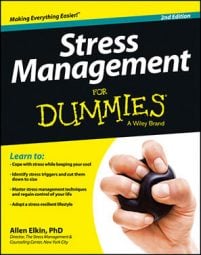Everyone feels anger sometimes. Unfortunately, too many people — and you may be one of them — experience too much anger too much of the time. Anger is not only terribly stressful, but it can also be harmful to your physical well-being and destructive to your relationships.
Are you angry because someone cut you off in traffic or kept you waiting for what seemed like an eternity? Are you angry because that clumsy guest spilled red wine on your sofa, or because your printer refuses to print?
Fortunately, ways of reducing your anger and limiting its consequences do exist. This chapter shows you how to control your anger — instead of letting your anger control you.
Does a big part of your stress come from your anger? Do you get just a little angry, or does your anger get out of control? The first step in reducing your anger is knowing how angry you are. Here is a simple, 12-item informal scale that helps you discover the role anger plays in your life.
For the following 12 statements, indicate the extent to which each one describes you. Jot down one of the following responses for each statement: not at all like me, a little like me, or a lot like me.
My family and/or friends tell me I get angry too easily.
I feel my anger is excessive.
My anger has frequently gotten me into trouble in the past.
I get frustrated pretty easily.
I hold on to my anger longer than I should.
I hate waiting or being kept waiting.
Petty annoyances can make me fly off the handle.
I take criticism and disapproval badly.
Incompetence and stupidity in others makes me angry.
I get angry when traffic or lines don’t move quickly enough.
Being treated rudely or unfairly makes me very angry.
In arguments, I’m usually the one who gets more angry.
For each time you responded “a lot like me,” give yourself three points. For each response of “a little like me,” give yourself two points. And for each response of “not at all like me,” give yourself a zero.
If you have fewer than 18 points, anger is not a major part of your life. If you have between 19 and 30 points, anger is affecting your life moderately. And if you have 31 to 36 points, anger is a definite presence in your life.
You may also want to get a second opinion. You may not be the best person to measure the length of your fuse, and a more objective evaluation couldn’t hurt. Why not have someone who knows you well answer the quiz for you? You may not feel you have a problem with your anger, but the people closest to you may have a different opinion.
Who knows? They may even see you as less angry than you see yourself. Compare your score with the score your loved one gives you and talk about any major discrepancies in scoring (but try not to get angry while you do so).

